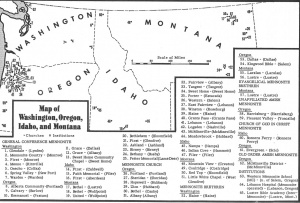Difference between revisions of "Idaho (USA)"
| [checked revision] | [checked revision] |
m (Combined images) |
m |
||
| Line 2: | Line 2: | ||
__TOC__ | __TOC__ | ||
[[File:Idaho1.jpg|285px|thumb|right|''Source: [http://en.wikipedia.org/wiki/File:Map_of_USA_ID.svg Wikipedia Commons]'']] | [[File:Idaho1.jpg|285px|thumb|right|''Source: [http://en.wikipedia.org/wiki/File:Map_of_USA_ID.svg Wikipedia Commons]'']] | ||
| − | [[File:ME4_893.jpg|300px|thumb| | + | [[File:ME4_893.jpg|300px|thumb|left|''Mennonites in Washington, Oregon, Idaho and Montana, 1950s.<br /> |
Source: Mennonite Encyclopedia, v. 4, p. 893. '']] | Source: Mennonite Encyclopedia, v. 4, p. 893. '']] | ||
= 1957 Article = | = 1957 Article = | ||
Revision as of 08:28, 27 December 2013

1957 Article
Idaho, with a population of 1,499,402 in 2007, admitted to the union as a state in 1890, has large areas of mountain and arid land, with the population chiefly inhabiting the south. Here, almost on the western border, less than 20 miles from the state capital of Boise, the first Mennonite settlement was begun in February 1899 by David Garber, and the Nampa Mennonite (MC) Church was organized the same year. Two other congregations of this group were later established in Idaho; viz., Filer (1914), some 150 miles southeast, and Indian Cove (1935) near Hammett, some 150 miles south of Nampa. In 1955 these three congregations had a total of 369 members.
The General Conference Mennonites (GCM) first came to Idaho in 1906, when a settlement was established at Aberdeen, about 200 miles east of Nampa. They organized a congregation in 1907. A second church (Emmanuel), established by division in 1912, three miles south, merged again with the Aberdeen church in 1930. Two other settlements near Aberdeen, the Minidoka mixed settlement (partly GCM, partly Central Conference), and the Dubois settlement (1910-1912), both failed. One other GCM settlement, at Caldwell, five miles from Nampa, was founded in 1941; a congregation was organized in 1947. A third church was organized in Filer in 1955. The three GCM congregations in 1955 had a total of 389 members, Aberdeen alone having 327.
A United Missionary church was organized in Filer in 1905. In 1949 it had 69 members. For a short period a Mennonite Brethren church also existed at Aberdeen (founded 1910) and a Central Conference church at Nampa (founded 1907). The Mountain View congregation of the Church of God in Christ, Mennonite, near Bonners Ferry, at the extreme northern point near the Canadian border, was organized in 1936 and had 92 members in 1955.
Thus the total Mennonite membership in Idaho in 1955 was 790, distributed as follows: General Conference Mennonite 389, Mennonite Church 369, Church of God in Christ, Mennonite 92. The Idaho settlements were all pioneer farming communities, those in the south depending almost exclusively on irrigation, built by settlers of widely varying backgrounds. All were located in or near small towns except those at Nampa, which had over 51,000 inhabitants. The settlements were of mixed background. The Nampa Mennonite (MC) Church operated a city mission in Nampa and a Christian day school called Nampa Mennonite School. The Mennonites (GCM) of Aberdeen built the Salem Deaconess Hospital at American Falls but sold it to the county because of financial difficulties. (Mennonitisches Lexikon 2, 400 f.) -- H. N. Harder
1990 Article
Idaho had 819 Mennonites in 1985, located at: Aberdeen (General Conference Mennonite), 317; Nampa, Filer and Boise (Mennonite Church), 232; Bonners Ferry (Church of God in Christ, Mennonite), 225; Hammett (unaffiliated), 33; Cataldo (Western Conservative Mennonite Fellowship), 12. Congregations that disbanded after 1955 were: Caldwell (GCM), 1947-1962; Faith (GCM) at Filer, a division of Filer (MC), 1955-1968; Highland (unaffiliated at Twin Falls, also a division of Filer [MC]), 1960-1964; City Acres (MC) at Nampa, 1963-1974. Disbanding and decreases in membership occurred due to limited irrigated farmland and employment opportunities, young people not returning after college, the influence of sects, changing neighborhoods, and divisive leadership. Hyde Park at Boise (1977) began as a mission outreach of Nampa, and Cataldo (1981) was a mission station of Porter (Western Conservative Mennonite Fellowship) at Estacada, Oregon. Aberdeen Mennonites dedicated Palisades Camp in 1963. Southern Idaho congregations began a Thrift and MCC Ten Thousand Villages shop in Nampa in 1980. -- Hope Kauffman Lind
Bibliography
Burkholder, H. D. The Story of Our Conference and Churches. North Newton: Mennonite Press, 1951: 58-64.
Campbell, Lee Price. "Seventy-Five Years on the Shore of the Peaceful Sea: A History of the Pacific District Conference of the General Conference Mennonite Church of North America." M.Div. thesis, Western Evangelical Seminary, Portland, OR, 1973: 17-24, 73-78.
Horsch, James E., ed. Mennonite Yearbook and Directory. Scottdale: Mennonite Publishing House (1988-89) :21.
Lind, Hope Kauffman. Apart & together : Mennonites in Oregon and neighboring states, 1876-1976. Scottdale, PA; Waterloo, Ont. : Herald Press, 1990.
| Author(s) | H. N. Harder |
|---|---|
| Hope Kauffman Lind | |
| Date Published | 1990 |
Cite This Article
MLA style
Harder, H. N. and Hope Kauffman Lind. "Idaho (USA)." Global Anabaptist Mennonite Encyclopedia Online. 1990. Web. 3 Feb 2026. https://gameo.org/index.php?title=Idaho_(USA)&oldid=105241.
APA style
Harder, H. N. and Hope Kauffman Lind. (1990). Idaho (USA). Global Anabaptist Mennonite Encyclopedia Online. Retrieved 3 February 2026, from https://gameo.org/index.php?title=Idaho_(USA)&oldid=105241.
Adapted by permission of Herald Press, Harrisonburg, Virginia, from Mennonite Encyclopedia, Vol. 3, p. 3; vol. 5, p. 413. All rights reserved.
©1996-2026 by the Global Anabaptist Mennonite Encyclopedia Online. All rights reserved.

